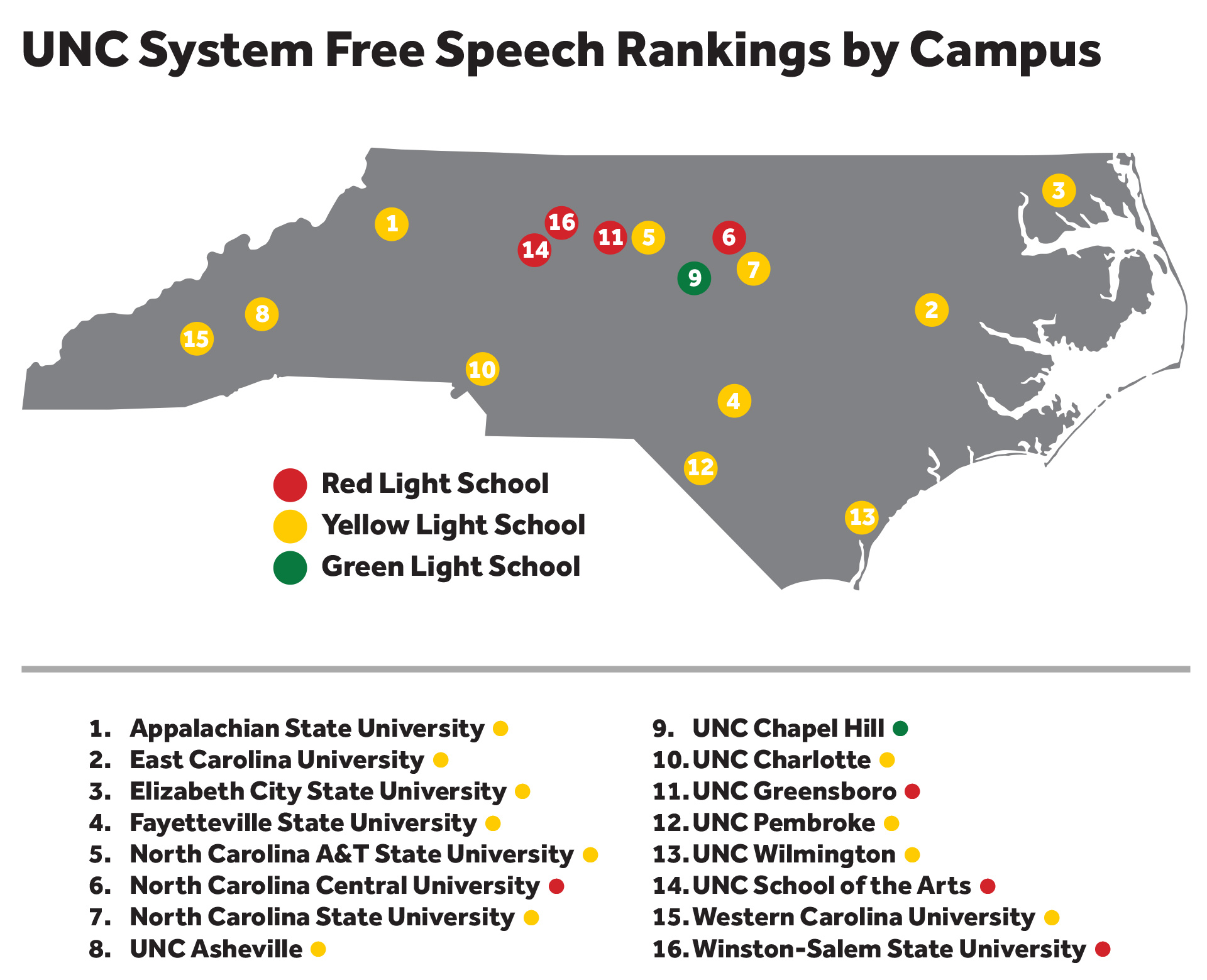RALEIGH — Fifteen of the 16 University of North Carolina system campuses fall short on free-speech protections, a prominent civil-liberties group says. But a new bill, championed by Lt. Gov. Dan Forest, may go far toward honoring students’ First Amendment rights.
House Bill 527, “Restore/Preserve Campus Free Speech,” is designed to maintain freedoms and bolster speech protections across the UNC system, said Steven Walker, Forest’s general counsel and policy adviser.
“As far as the principles of free speech, we’re really not breaking any new ground as to what First Amendment law has been,” Walker told Carolina Journal. “We’re just making sure that things are in place to make sure that we’re following that law properly.”
UNC schools currently operate under separate speech codes, with no overlapping policies. No particular cases of censorship or speech violations triggered the drafting of H.B. 527, Walker said, but a recent study of UNC’s campus codes helped to push the legislation forward.
The Foundation for Individual Rights in Education, a nonpartisan research and litigation organization, in 2016 rated 449 public and private higher-ed institutions nationwide in three categories: red light, yellow light, and green light. Red- and yellow-light schools enforce unconstitutional policies that violate or abuse open speech. Green-light schools uphold First Amendment rights.

Only one UNC campus, Chapel Hill, ranked as a green-light school. Eleven others were ranked yellow, and the remaining four were designated red.
North Carolina State University in Raleigh, which has a yellow ranking, last year overhauled some of its rules after an evangelical campus group sued over free speech violations.
The plaintiff, Grace Christian Life, filed a lawsuit against the university after group members were told they needed a permit to talk about religion with students while handing out flyers on campus.
N.C. State settled in July 2016, paying the plaintiff’s legal fees and discontinuing the school’s permit policy for non-commercial solicitation on campus.
It’s this type of situation that would be preventable under H.B. 527, Robert Shibley, executive director of FIRE, told CJ.
“One hopes that with the passage of this law in some form, or something like it, we see those policies reformed ahead of time by universities so they don’t have to be sued to fulfill their obligations,” he said.
“The sticking point with free speech is that everyone agrees that free speech is important for themselves, but not necessarily for their opponents, which is why it needs to be enforced in a principled fashion. Whether it’s through laws like this, or through policies on the campus or system level, the option to censor speech can’t be there — or somebody is going to use it,” Shibley added.
H.B. 527, among other things, directs the UNC Board of Governors to adopt a campus-wide speech policy stating, “The primary function of each constituent institution is the discovery, improvement, transmission, and dissemination of knowledge by the means of research, teaching, discussion, and debate.”
The bill also stipulates that —
- Universities should not shield individuals from speech, including ideas and opinions that are unwelcome, disagreeable, or even deeply offensive.
- Students and faculty should have the freedom to assemble spontaneously as long as the activity is lawful and doesn’t disrupt normal university functions.
- On-campus protests are welcome so long as demonstrations are lawful and orderly. Any protests that “infringe upon the rights of others to engage in or listen to expressive activity shall not be permitted and shall be subject to sanction.”
- Campuses are open to any speaker students, student groups, or members of the faculty have invited.
- Disciplinary sanctions apply to anyone who, under university jurisdiction, interferes with the free expression of others.
- Campuses should strive to remain neutral on the public policy controversies of the day.
H.B. 527 also would require the BOG to form an 11-member Committee on Free Expression to oversee appropriate disciplinary policies and accountability measures, Walker said.
While free speech violations across UNC campuses are considerably few, any effort to protect First Amendment rights is valuable, BOG member David Powers told CJ.
“I think a campus is nothing if not a marketplace of ideas. And you have the right to be exposed to all ideas, and you do not have the right to not be exposed to certain ideas just because you disagree with them,” Powers said.
“A college campus in America should be the one place that has the greatest range of free speech,” he added.
However, Powers is concerned about one part of the bill, permitting lawsuits in the case of “expressive rights” violations.
“I’m not a big fan of expanding the ability to bring lawsuits. That’s not my preferred remedy. Having been involved, and having watched the university be involved in lawsuits, it’s a time-consuming and costly matter for the university,” he said.
A university-based appeals process, which already is used in other instances, might be a better solution, Powers said.
Walker said the parties involved in supporting h.B. 527 were open to making changes if needed.
“We’re willing to work and get something we can all agree on as long as the principles are the same. And that’s the good thing,” he said. “We agree on the principles of the thing. [Any disagreement] is more about logistics than it is about any question of ‘are we going to partake in free speech or not?’”